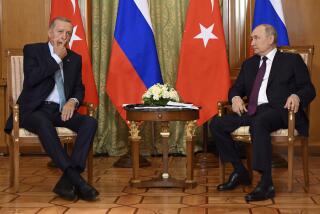Grain: Bad Business
- Share via
The extension of the U.S.-Soviet grain agreement is a disappointment. It perpetuates everything that was wrong with the 1983 agreement, and it probably prolongs the costly subsidies that have proved essential to making the wheat sales without gaining the increased sales that American farmers had expected.
American negotiators are defending the agreement as better than nothing; perhaps that is true. It is significant that Moscow had already bought all of the current year’s quota for corn and soybeans before the agreement extension was signed. That leaves only the ambiguous subject of wheat to be worked out this year.
There is one significant advantage that in itself may be worth the trouble. As one Department of Agriculture official put it, the agreement assures the transparency of Soviet purchases of grain in the United States, preventing a repetition of 1972 when secret and massive Soviet purchases depleted American stocks and distorted world markets. It was the crisis of that year, when Soviet grain traders outsmarted the world market, that inspired the negotiation of the first U.S.-Soviet grain accord in 1975.
Wheat is ambiguous under the new grain agreement, as it was under the 1983 agreement, because the two nations cannot agree on what it means in terms of price. In 1985 and 1986 the Soviet Union’s purchases of wheat from the United States fell 5 million tons below the agreed purchase level because the Soviets argued that the American price was uncompetitive. Since then the United States has sold wheat to the Soviet Union at a subsidized price in order to bring the cost into line with what other major suppliers like the European Community, Canada, Australia and Argentina have been charging. In the last three years, at a cost of about $900 million a year, the United States has sold 49 million tons of wheat abroad--13 million tons of that total to the Soviets. American officials regard it as a subsidy to American farmers rather than to Russian consumers, but that has not stilled the controversy over the export program.
The Soviets’ reluctance to negotiate a longer and clearer purchase agreement also reflected confidence in Moscow that they will do better in the years ahead in terms of their own production and then be able to reduce their dependence on imports. That has proved an elusive goal in the past. But American farmers also have an elusive goal: the production of wheat that is competitive in world markets without subsidies.
More to Read
Sign up for Essential California
The most important California stories and recommendations in your inbox every morning.
You may occasionally receive promotional content from the Los Angeles Times.










